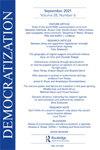解释行政分权中的立法机构失灵:2010-2020年吉尔吉斯斯坦立法质量的代表意义制定及其影响
IF 2.9
1区 社会学
Q1 POLITICAL SCIENCE
引用次数: 0
摘要
在行政分权的庇护制度中,立法机构一直是抵制单一庇护金字塔中权力集中的场所。在2010年至2020年期间,吉尔吉斯议会既不是反对派的场所,也没有向-à-vis行政部门展示立法机构,这在行政分权的国家体系中是一个反常现象。相反,在2020年的另一场起义之后,一个统一的单一的个人金字塔被重新建立起来。本文采用一种根植于意义制造符号学的方法,并利用议会代表访谈数据集和一系列文献资料,通过揭示代表意义制造与更广泛的制度和文化约束之间的一系列对话关系,补充了现有的解释薄弱立法机构的制度方法,这些制约因素塑造了吉尔吉斯斯坦议会的整体质量和实力。这些关系涉及立法主动性,保护私人利益和代表权,在更广泛的体制和文化背景下,赋予的意义与其构成之间的相互作用有助于减少立法机构对-à-vis总统的影响。吉尔吉斯斯坦说明了意义创造作为一种理解非民主背景下立法-行政关系的方法的价值,以及它在塑造立法机构时与文化和制度约束相结合的影响。本文章由计算机程序翻译,如有差异,请以英文原文为准。
Explaining the failure of legislative agency in patronal divided executives: deputy meaning making and its impact on legislative quality in Kyrgyzstan 2010–2020
In divided-executive patronal systems, legislatures have been sites of resistance to the centralization of power in a single patronal pyramid. Kyrgyzstan is an anomaly among divided-executive patronal systems when between 2010 to 2020, the Kyrgyz parliament was neither a site of opposition nor did it demonstrate legislative agency vis-à-vis the executive. Instead, following another uprising in 2020, a unified single patronal pyramid was re-established. Adopting an approach rooted in the semiotics of meaning making and drawing on a dataset of interviews with parliamentary deputies and a range of documentary sources, this article complements existing institutional approaches to explaining weak legislative agency by revealing a series of dialogical relationships between deputy meaning making and broader institutional and cultural constraints which shaped the Kyrgyz’s parliament’s overall quality and strength. These relationships pertain to legislative initiative, the protection of private interests and representation, with the interplay between the ascribed meaning and its constitution within broader institutional and cultural context contributing to the diminishment of legislative agency vis-à-vis the presidency. Kyrgyzstan illustrates the value of meaning making as an approach to understanding legislative-executive relations in non-democratic contexts, and its impact in conjunction with cultural and institutional constraints in shaping legislative agency.
求助全文
通过发布文献求助,成功后即可免费获取论文全文。
去求助
来源期刊

Democratization
POLITICAL SCIENCE-
CiteScore
6.40
自引率
12.50%
发文量
73
期刊介绍:
Democratization aims to promote a better understanding of democratization - defined as the way democratic norms, institutions and practices evolve and are disseminated both within and across national and cultural boundaries. While the focus is on democratization viewed as a process, the journal also builds on the enduring interest in democracy itself and its analysis. The emphasis is contemporary and the approach comparative, with the publication of scholarly contributions about those areas where democratization is currently attracting considerable attention world-wide.
 求助内容:
求助内容: 应助结果提醒方式:
应助结果提醒方式:


